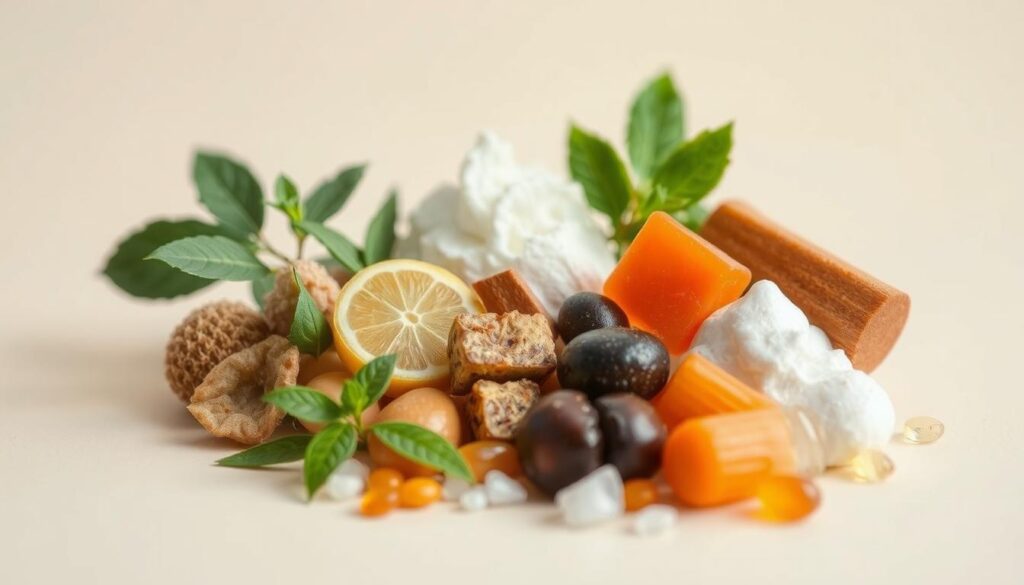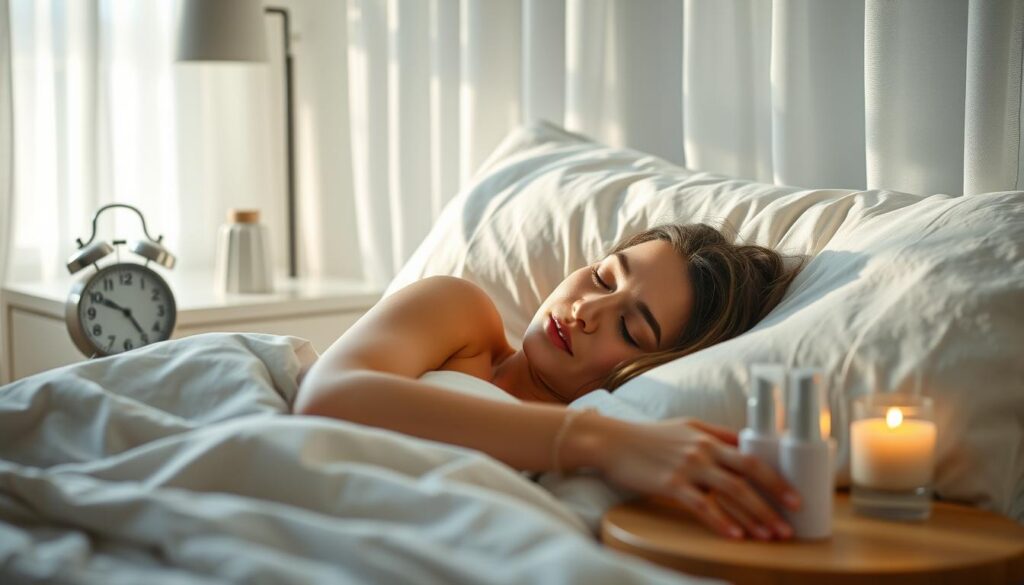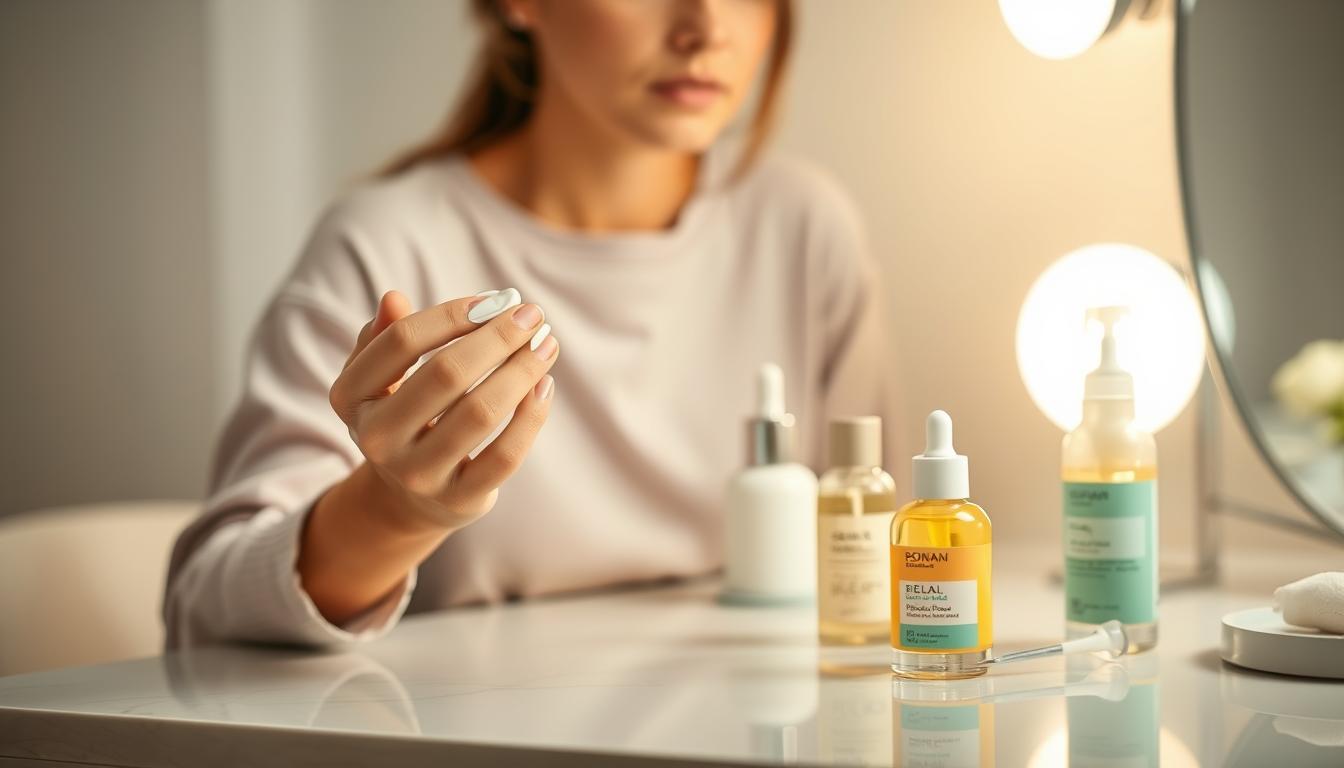Did you know your skin is the biggest organ in your body? It’s key in keeping you safe from harm. Basic skin care and healthy lifestyle choices can greatly affect your skin’s health and look.
The Mayo Clinic says a regular skincare routine can stop early aging and skin problems. Just a few easy changes in your daily life can keep your skin looking young and healthy.
Key Takeaways
- Establish a consistent skincare routine to maintain healthy skin.
- Protect your skin from external damage with a healthy lifestyle.
- Simple skincare habits can prevent premature aging.
- A healthy lifestyle complements your skincare routine.
- Basic skin care is essential for maintaining youthful-looking skin.
Understanding Premature Aging
Premature aging worries many people. Knowing what causes it is the first step to stop it. It’s when you see wrinkles, fine lines, and age spots early. These signs can come from genes, the environment, and how you live.
What is Premature Aging?
Premature aging shows early signs of aging. This can happen due to genes, the environment, and lifestyle. The American Academy of Dermatology says it’s a mix of these factors.
Signs include wrinkles, age spots, and skin losing its firmness. Knowing these signs helps you prevent them.
Common Causes of Premature Aging
Many things cause premature aging. UV exposure is a big one. It harms the skin’s collagen and elastin, causing wrinkles.
- Smoking: It speeds up aging by cutting off blood flow and damaging skin.
- Poor Skincare Habits: Not taking care of your skin can lead to early aging.
- Environmental Stressors: Pollution and other stressors also cause premature aging.
Signs to Look Out For
Knowing the signs of premature aging helps you act fast. Common signs are:
| Signs | Description |
|---|---|
| Wrinkles and Fine Lines | Deep lines and wrinkles from losing skin elasticity. |
| Age Spots | Dark spots from too much sun. |
| Loss of Skin Elasticity | Skin losing firmness and sagging. |
By spotting these signs and knowing why they happen, you can fight aging. Use anti-aging tips and strategies to keep your skin looking young.
“Protecting your skin from the sun, not smoking, and using gentle skincare products are simple yet effective ways to prevent premature aging.”
The Importance of a Skincare Routine
To stop skin aging too soon, it’s key to have a daily skincare regimen that fits your skin needs. A regular routine keeps your skin looking young and healthy. It tackles specific skin issues and stops aging early.
CeraVe suggests a daily skincare routine that keeps your skin moist and fixes its natural barrier. This makes your skin healthier and look better.
Benefits of Consistency
Being consistent is vital for the best results from your skincare regimen. Sticking to your routine lets your skin soak up the good stuff. This improves your skin’s health over time.
- Enhanced skin hydration
- Improved skin elasticity
- Reduced appearance of fine lines and wrinkles
Skincare experts say a steady routine is key for healthy skin and less aging signs. This shows how important it is to keep going with your skincare.
Tailoring Your Routine to Your Skin Type
It’s important to make your skincare regimen fit your skin type for the best results. Whether your skin is dry, oily, combination, or sensitive, picking the right products is critical.
If you have dry skin, choose moisturizing products for lasting hydration. For oily skin, go for light, oil-free items that won’t block pores.
“Understanding your skin type is the first step towards creating an effective skincare routine.”
By following healthy skin habits, like a consistent skincare routine, you can get skin that’s healthier and more resilient. It will look its best.
Daily Cleansing Practices
Having a daily cleansing routine is key for healthy, youthful skin. It removes dirt, oil, and impurities that clog pores. This can cause skin problems. A gentle, effective cleansing practice in your daily routine helps keep your skin clear and radiant.
Choosing the Right Cleanser
Choosing the right cleanser is important. The Mayo Clinic suggests using a mild cleanser with lukewarm water. For sensitive skin, a fragrance-free, hypoallergenic cleanser is best to avoid irritation.
If you have dry skin, choose a moisturizing cleanser. For oily skin, a cleanser with salicylic acid or benzoyl peroxide can help control oil and reduce acne.
The Importance of Gentle Cleansing
Gentle cleansing is vital to prevent stripping the skin of its natural oils. This can cause dryness and irritation. Gentle cleansing also keeps the skin’s barrier function strong, keeping it healthy and resilient.
Use a gentle touch and avoid harsh scrubbing. Lukewarm water is better than hot water, which can dry out the skin.
When to Cleanse Your Face
Cleansing your face twice a day is usually best. Once in the morning to remove overnight buildup, and once at night to remove daily dirt and impurities. Adjust your cleansing frequency based on your skin type and activities.
- If you have dry or sensitive skin, cleanse less often to keep natural oils.
- If you’re active or live in a polluted area, cleanse more often to remove dirt and impurities.
Moisturizing for Healthy Skin
Moisturizing is key in skin aging prevention. It keeps your skin hydrated and soft. It’s a must in a good skincare routine. It locks in moisture and stops dryness, keeping your skin healthy and strong.
Types of Moisturizers
There are many moisturizers for different skin types. The American Academy of Dermatology says pick one that fits your skin. Whether it’s dry, oily, or a mix.
- For Dry Skin: Choose rich, hydrating ones with hyaluronic acid and ceramides.
- For Oily Skin: Go for light, oil-free ones that won’t block pores.
- For Combination Skin: Find moisturizers that hydrate without making it oily.
How to Properly Apply Moisturizer
Applying moisturizer right is important. Put it on damp skin after washing. This helps keep moisture in.
“Applying moisturizer on damp skin can enhance its effectiveness by trapping moisture.”
Massage it in gently, moving upwards. Make sure it’s fully absorbed.
Ingredients to Look for in Moisturizers
When picking a moisturizer, look for ingredients that hydrate well. The American Academy of Dermatology suggests:
| Ingredient | Benefit |
|---|---|
| Hyaluronic Acid | Provides intense hydration |
| Ceramides | Repairs the skin’s barrier function |
| Niacinamide | Improves skin elasticity and reduces inflammation |
Adding the right moisturizer to your skincare routine boosts your skin’s health. It helps prevent skin aging.
Sun Protection is Key
Sun protection is vital to prevent early aging. UV rays can harm your skin, causing wrinkles and age spots.
Understanding SPF and Its Importance
SPF stands for Sun Protection Factor. It shows how well a sunscreen blocks UVB rays. The American Cancer Society suggests using a SPF of at least 30 for broad-spectrum protection.
SPF doesn’t measure how long protection lasts. It shows how well a sunscreen blocks UVB rays. For example, SPF 30 means your skin won’t burn for 300 minutes, not 30.
Choosing the Right Sunscreen
Choose a broad-spectrum sunscreen to protect against UVA and UVB rays. UVA rays cause aging and damage. Consider your skin type when picking a sunscreen.
| Skin Type | Sunscreen Recommendation |
|---|---|
| Oily Skin | Lightweight, oil-free sunscreen |
| Dry Skin | Moisturizing sunscreen with hyaluronic acid |
| Sensitive Skin | Mineral sunscreen with zinc oxide or titanium dioxide |
Applying Sunscreen Correctly
Apply sunscreen right to get the best results. Use enough for all exposed skin 15-30 minutes before going outside. Remember to cover often-overlooked areas like ears, nose, and neck. Reapply every two hours or after swimming or sweating.
“Sunscreen is most effective when used in conjunction with other sun protection measures, such as wearing protective clothing and seeking shade.”
By knowing about SPF, picking the right sunscreen, and applying it right, you can lower your risk of early aging and skin damage from UV rays.
The Role of Antioxidants in Skincare
Antioxidants are key in keeping your skin safe from harm and making it glow. Knowing what antioxidants are and how they work helps you choose the right skincare.
What Are Antioxidants?
Antioxidants fight off free radicals, which are harmful molecules. They help protect your skin cells. The Mayo Clinic says antioxidants can make your skin look younger by reducing signs of aging.
Vitamin C and Vitamin E are famous for their antioxidant powers. They work together to improve your skin’s health and look.
Best Sources of Antioxidants for the Skin
There are many ways to add antioxidants to your skincare. Using products like serums and moisturizers is effective. Eating foods full of antioxidants also helps your skin from the inside.
Some top antioxidant foods for your skin are:
- Berries rich in Vitamin C
- Nuts and seeds containing Vitamin E
- Green tea, known for its high antioxidant content

Using these foods and a good skincare routine boosts your skin’s antioxidant benefits.
Hydration and Nutrition
Hydration and nutrition are key for healthy skin and preventing early aging. Drinking lots of water and eating a balanced diet are essential. They help keep your skin looking young and healthy.
The Impact of Hydration on Skin Health
Drinking enough water is vital for keeping your skin soft and moist. Water removes toxins from your body, which can harm your skin. The Mayo Clinic says drinking water helps keep your skin hydrated.
When your skin is well-hydrated, it glows and wrinkles less. Hydration also keeps your skin elastic, making it look younger and healthier.
Foods that Promote Youthful Skin
Eating a diet full of fruits, veggies, and whole grains is good for young skin. Antioxidant-rich foods like berries, leafy greens, and nuts fight off skin damage.
“A diet rich in omega-3 fatty acids, found in fish and nuts, can help reduce inflammation and promote healthy skin.”
Foods high in vitamins C and E, like citrus fruits and almonds, are also beneficial. They boost collagen and protect against damage.
By focusing on hydration and nutrition, you can greatly improve your skin’s health and look. A good skincare routine includes a balanced diet and enough water. This helps prevent early aging and keeps your skin looking radiant and youthful.
Sleep and Its Effects on Skin
Sleep is key for skin repair and rejuvenation. It helps your body fix damaged cells and build new ones. This keeps your skin looking young and healthy.
How Sleep Affects Skin Aging
Not enough sleep can make your skin look dull and wrinkly. The American Academy of Dermatology says sleep helps reduce wrinkles. It also fights inflammation, which can worsen acne and rosacea.
Sleep and Skin Health Connection: Sleep boosts collagen production, keeping your skin firm. Poor sleep can lead to early aging.
“Sleep is the best meditation.” – Dalai Lama XIV
Good sleep is vital for skin health. Here are some tips to improve your sleep:
Tips for Improving Sleep Quality
- Stick to a regular sleep schedule to keep your body clock in sync.
- Make your bedroom dark, quiet, and cool for better sleep.
- Stay away from caffeine and screens before bed to help you sleep.
- Choose a comfy mattress and pillows for better rest.
Consistency is key for better sleep. Prioritizing sleep can make your skin look great.

| Sleep Quality | Impact on Skin |
|---|---|
| Good Sleep | Improved skin elasticity, reduced fine lines and wrinkles |
| Poor Sleep | Increased inflammation, dullness, and drooping |
Regular Skin Treatments
To keep your skin looking healthy and young, it’s key to add regular skin treatments to your skincare practices. These treatments can tackle specific skin issues and make your skin glow.
Professional Treatments
The American Academy of Dermatology suggests getting professional treatments like chemical peels or microdermabrasion. These can be adjusted to fit your skin type and needs.
Popular Anti-Aging Treatments
Anti-aging treatments can lessen early aging signs. Whether you choose at-home or professional options, they help keep your skin looking young and healthy.
FAQ
What are the most effective ways to prevent premature aging?
To stop premature aging, you need good skincare, a healthy lifestyle, and protection from the environment. Use a consistent skincare routine, drink plenty of water, eat well, and protect your skin from the sun. This keeps your skin looking young and healthy.
How often should I cleanse my face to prevent premature aging?
Cleanse your face twice a day to remove dirt and impurities that cause aging. Be gentle and choose a cleanser that fits your skin type.
What type of moisturizer should I use to keep my skin hydrated?
Choose a moisturizer that keeps your skin hydrated for a long time. Look for ones with hyaluronic acid, ceramides, and niacinamide. These help keep your skin moist and youthful.
How can I protect my skin from the sun to prevent premature aging?
Understanding SPF and picking the right sunscreen is key. Apply sunscreen right, and reapply often. This helps keep your skin healthy and young.
What role do antioxidants play in preventing premature aging?
Antioxidants protect your skin from environmental stress and keep it looking young. Use them in your skincare or eat foods like fruits, veggies, and whole grains.
How does sleep affect skin aging, and how can I improve my sleep quality?
Sleep is vital for healthy skin. Bad sleep can cause signs of aging like dark circles and dull skin. To sleep better, stick to a routine, avoid caffeine and screens at night, and relax before bed.
What are some popular anti-aging treatments that I can consider?
Popular treatments include chemical peels, microdermabrasion, and laser therapy. They can reduce signs of aging like lines, wrinkles, and spots. Talk to a skincare expert to find the best treatment for you.
Can I prevent premature aging by making lifestyle changes?
Yes, changing your lifestyle can help prevent aging. Quit smoking, reduce stress, and stay hydrated. A healthy lifestyle and good skincare can keep your skin looking young.

